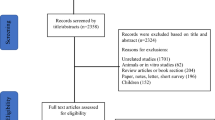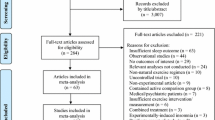Abstract
Goals of work
The goal of this study is to characterize sleep quality and quantity prior to and in the first three nights after initial chemotherapy for breast cancer.
Materials and methods
This study makes use of secondary analysis of data from two separate randomized clinical trials (RCT) of behavioral interventions to improve fatigue and sleep. Patients came from two comprehensive cancer centers, three clinical cancer centers, and 10 community clinics in five states. Participants were women with stage I–IIIA breast cancer treated with anthracycline and/or cyclophosphamide-based regimens.
Main results
Baseline data from each RCT were used in the analysis. Sixty-five percent of women self-reported poor sleep in the month preceding chemotherapy using the Pittsburgh Sleep Quality Index (PSQI) score >5. Three nights of actigraphy data indicated a wide range of sleep experience with an average of 10 awakenings and time (minutes) awake after sleep onset (WASO-M) averaging 61 min per night. The first night’s sleep was the worst. There was no statistically significant relationship between self-reported poor sleep and sleep measures obtained by actigraphy. Women with poor sleep at baseline (global PSQI >5) had significantly lower (p < 0.001) physical (PCS) and mental (MCS) health status. However, neither the PCS nor MCS was associated with any of the average actigraphy sleep parameters or night 1 parameters in the aggregated sample. Increasing age was also associated with poorer sleep.
Conclusions
A high percent of women with breast cancer begin chemotherapy with disturbed sleep and the initial nights after chemotherapy are characterized by sleep fragmentation that disrupts sleep maintenance. Interventions should focus on strategies to decrease the number and duration of night awakenings. Further research is needed to identify predictors of poor sleep during this time.
Similar content being viewed by others
References
Berger AM, Parker KP, Young-McCaughan S, Mallory GA, Barsevick AM, Beck SL et al (2005) Sleep wake disturbances in people with cancer and their caregivers: State of the science. Oncol Nurs Forum 32:E98–E1126
Savard J, Morin CM (2001) Insomnia in the context of cancer: a review of a neglected problem. J Clin Oncol 19:895–908
Lee K, Cho M, Miaskowski C, Dodd M (2004) Impaired sleep and rhythms in persons with cancer. Sleep Med Rev 8:199–212
Clark J, Cunningham M, McMillan S, Vena C, Parker K (2004) Sleep-wake disturbances in people with cancer part ii: evaluating the evidence for clinical decision making. Oncol Nurs Forum 31:747–771
Savard J, Simard S, Blanchet J, Ivers H, Morin CM (2001) Prevalence, clinical characteristics, and risk factors for insomnia in the context of breast cancer. Sleep 24:583–590
Carpenter JS, Andrykowski MA (1998) Psychometric evaluation of the Pittsburgh Sleep Quality Index. J Psychosom Res 45:5–13
Berger AM, Farr L (1999) The influence of daytime inactivity and nighttime restlessness on cancer-related fatigue. Oncol Nurs Forum 26:1663–1671
Berger AM, Higginbotham P (2000) Correlates of fatigue during and following adjuvant breast cancer chemotherapy: a pilot study. Oncol Nurs Forum 27:1443–1448
Broeckel JA, Jacobsen PB, Horton J, Balducci L, Lyman GH (1998) Characteristics and correlates of fatigue after adjuvant chemotherapy for breast cancer. J Clin Oncol 16:1689–1696
Redeker NS, Lev EL, Ruggiero J (2000) Insomnia, fatigue, anxiety, depression, and quality of life of cancer patients undergoing chemotherapy. Sch Inq Nurs Pract 14:275–298
Berger AM (1998) Patterns of fatigue and activity and rest during adjuvant breast cancer chemotherapy. Oncol Nurs Forum 25:51–62
Berger AM, VonEssen S, Khun BR, Piper BF, Farr L, Agrawal S et al (2002) Feasibilty of a sleep intervention during adjuvant breast cancer chemotherapy. Oncol Nurs Forum 29:1431–1441
Payne J, Piper B, Rabinowitz I, Zimmerman B (2006) Biomarkers, fatigue, sleep, and depressive symptoms in women with breast cancer: a pilot study. Oncol Nurs Forum 33:775–783
Lee-Chiong TL Jr (2004) Sleep and sleep disorders: an overview. Med Clin North Am 88:xi–xiv. doi:10.1016/j.mcna.2004.02.005
Miaskowski C, Lee KA (1999) Pain, fatigue, and sleep disturbances in oncology outpatients receiving radiation therapy for bone metastasis: a pilot study. J Pain Symptom Manage 17:320–332. doi:10.1016/S0885-3924(99)00008-1
Buysse DJ, Reynolds CF 3rd, Monk TH, Berman SR, Kupfer DJ (1989) The Pittsburgh Sleep Quality Index: a new instrument for psychiatric practice and research. Psychiatry Res 28:193–213. doi:10.1016/0165-1781(89)90047-4
Beck SL, Schwartz AL, Towsley G, Dudley W, Barsevick A (2004) Psychometric evaluation of the Pittsburgh Sleep Quality Index in cancer patients. J Pain Symptom Manage 27:140–148. doi:10.1016/j.jpainsymman.2003.12.002
Brown AC, Smolensky MH, D'Alonzo GE, Redman DP (1990) Actigraphy: a means of assessing circadian patterns in human activity. Chronobiol Int 7:125–133. doi:10.3109/07420529009056964
Kripke DF, Mullaney DJ, Messin S, Wyborney VG (1978) Wrist actigraphic measures of sleep and rhythms. Electroencephalogr Clin Neurophysiol 44:674–676. doi:10.1016/0013-4694(78)90133-5
Hauri P, Wisbey J (1994) Actigraphy and insomnia: a closer look. Part 2. Sleep: 408–410.
Jean-Louis G, von Gizycki H, Zizi F, Spielman A, Hauri P, Taub H (1997) The actigraph data analysis software: II. A novel approach to scoring and interpreting sleep-wake activity. Percept Mot Skills 85:219–226
Ancoli-Israel S, Cole R, Alessi C, Chambers M, Moorcroft W, Pollak CP (2003) The role of actigraphy in the study of sleep and circadian rhythms. Sleep 26:342–392
Blackwell T, Ancoli-Israel S, Gehrman PR, Schneider JL, Pedula KL, Stone KL (2005) Actigraphy scoring reliability in the study of osteoporotic fractures. Sleep 28:1599–1605
Lichstein KL, Stone KC, Donaldson J, Nau SD, Soeffing JP, Murray D et al (2006) Actigraphy validation with insomnia. Sleep 29:232–239
Ware JE Jr, Snow KK, Kosinski M, Gandek B (1993) SF-36 health survey manual and interpretation guide. The Health Institute, New England Medical Center, Boston
Tsai C, Bayliss MS, Ware JE (1997) SF-36 health survey annotated bibliography, 2nd edn. Heath Assessment Lab, New England Medical Centre, Boston
Ware JE, Kosinski M (2007) SF-36 physical and mental health summaerty scales: a manual for users of version 1, 2nd edn. Quality Metric, Lincoln
McHorney CA, Ware JE Jr, Raczek AE (1993) The MOS 36-item short-form health survey (SF-36): II. Psychometric and clinical tests of validity in measuring physical and mental health constructs. Med Care 31:247–263. doi:10.1097/00005650-199303000-00006
Ware J Jr, Kosinski M, Keller SD (1996) A 12-item short-form health survey: construction of scales and preliminary tests of reliability and validity. Med Care 34:220–233. doi:10.1097/00005650-199603000-00003
Hurst NP, Ruta DA, Kind P (1998) Comparison of the MOS short form-12 (SF12) health status questionnaire with the SF36 in patients with rheumatoid arthritis. Br J Rheumatol 37:862–869. doi:10.1093/rheumatology/37.8.862
Muller-Nordhorn J, Roll S, Willich SN (2004) Comparison of the short form (SF)-12 health status instrument with the SF-36 in patients with coronary heart disease. Heart 90:523–527. doi:10.1136/hrt.2003.013995
Barker LE, Luman ET, McCauley MM, Chu SY (2002) Assessing equivalence: an alternative to the use of difference tests for measuring disparities in vaccination coverage. Am J Epidemiol 156:1056–1061. doi:10.1093/aje/kwf149
Schuirmann DJ (1987) A comparison of the two one-sided tests procedure and the power approach for assessing the equivalence of average bioavailability. J Pharmacokinet Biopharm 15:657–680. doi:10.1007/BF01068419
Lineberger MD, Carney CE, Edinger JD, Means MK (2006) Defining insomnia: quantitative criteria for insomnia severity and frequency. Sleep 29:479–485
Fortner BV, Stepanski EJ, Wang SC, Kasprowicz S, Durrence HH (2002) Sleep and quality of life in breast cancer patients. J Pain Symptom Manage 24:471–480. doi:10.1016/S0885-3924(02)00500-6
Ancoli-Israel S, Liu L, Marler MR, Parker BA, Jones V, Sadler GR et al (2006) Fatigue, sleep, and circadian rhythms prior to chemotherapy for breast cancer. Support Care Cancer 14:201–209. doi:10.1007/s00520-005-0861-0
Berger AM, Sankaranarayanan J, Watanabe-Galloway S (2007) Current methodological approaches to the study of sleep disturbances and quality of life in adults with cancer: a systematic review. Psychooncology 16:401–420. doi:10.1002/pon.1079
Nail LM (2002) Fatigue in patients with cancer. Oncol Nurs Forum 29:537–546. doi:10.1188/ONF.537-546
Buysse DJ, Hall ML, Strollo PJ, Kamarck TW, Owens J, Lee L et al (2008) Relationships between the Pittsburgh Sleep Quality Index (PSQI), Epworth Sleepiness Scale (ESS), and clinical/polysomnographic measures in a community sample. J Clin Sleep Med 4:563–571
Espie CA, Fleming L, Cassidy J, Samuel L, Taylor LM, White CA et al (2008) Randomized controlled clinical effectiveness trial of cognitive behavior therapy compared with treatment as usual for persistent insomnia in patients with cancer. J Clin Oncol 26:4651–4658. doi:10.1200/JCO.2007.13.9006
Vitiello MV, Larsen LH, Moe KE (2004) Age-related sleep change: gender and estrogen effects on the subjective-objective sleep quality relationships of healthy, noncomplaining older men and women. J Psychosom Res 56:503–510. doi:10.1016/S0022-3999(04)00023-6
Vitiello MV (2007) Growing old should not mean sleeping poorly: recognizing and properly treating sleep disorders in older adults. J Am Geriatr Soc 55:1882–1883. doi:10.1111/j.1532-5415.2007.01401.x
Ohayon MM, Carskadon MA, Guilleminault C, Vitiello MV (2004) Meta-analysis of quantitative sleep parameters from childhood to old age in healthy individuals: developing normative sleep values across the human lifespan. Sleep 27:1255–1273
Friedman EM, Love GD, Rosenkranz MA, Urry HL, Davidson RJ, Singer BH et al (2007) Socioeconomic status predicts objective and subjective sleep quality in aging women. Psychosom Med 69:682–691. doi:10.1097/PSY.0b013e31814ceada
Acknowledgement
We would like to thank Sangeeta Agrawal for her assistance in statistical analysis; Patricia A. Fischer, Jia-Wen Guo, and Bharathi Vedula for their assistance in actigraphy analysis; project staff, Tracey Newhall, Susan Brown & Karen Lindau; physicians, nurses, and support staff in participating clinics; and the women with breast cancer who participated in our studies.
Funding was provided by NINR 2 R01 NR04573 and NINR 5R01NR007762-05
Author information
Authors and Affiliations
Corresponding author
Additional information
This work was performed at University of Utah College of Nursing and the Huntsman Cancer Institute in Salt Lake City, UT, USA; University of Nebraska Medical Center/Eppley Cancer Center, Oncology Hematology West PC, and the Southeastern Nebraska Hematology/Oncology Consultants in Omaha, NE, USA; and Fox Chase Cancer Center in Philadelphia, PA, USA, Helen F. Graham Cancer Center in Newark, DE, USA, and University of Cincinnati in Cincinnati, OH, USA
Rights and permissions
About this article
Cite this article
Beck, S.L., Berger, A.M., Barsevick, A.M. et al. Sleep quality after initial chemotherapy for breast cancer. Support Care Cancer 18, 679–689 (2010). https://doi.org/10.1007/s00520-009-0662-y
Received:
Accepted:
Published:
Issue Date:
DOI: https://doi.org/10.1007/s00520-009-0662-y




